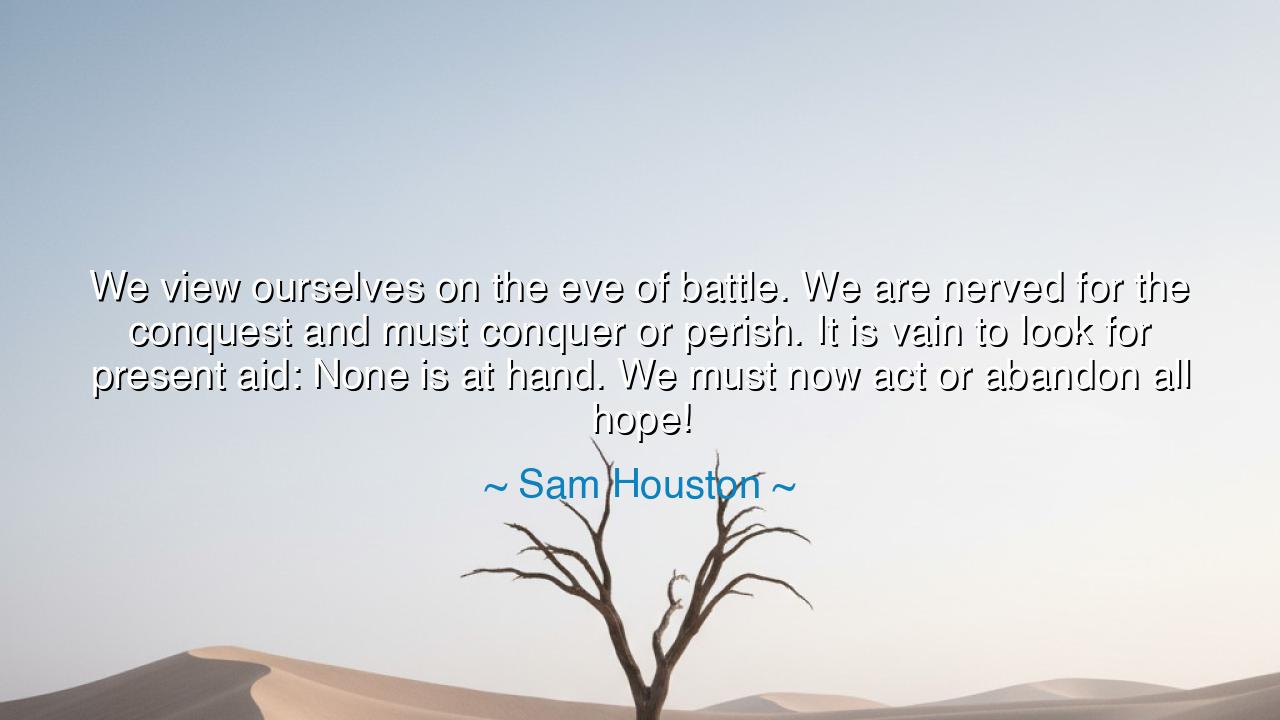
We view ourselves on the eve of battle. We are nerved for the
We view ourselves on the eve of battle. We are nerved for the conquest and must conquer or perish. It is vain to look for present aid: None is at hand. We must now act or abandon all hope!






When Sam Houston proclaimed, “We view ourselves on the eve of battle. We are nerved for the conquest and must conquer or perish. It is vain to look for present aid: None is at hand. We must now act or abandon all hope!” he spoke with the fiery conviction of a man who had placed his fate—and the fate of his people—into the hands of courage itself. These were not the words of a man uncertain or afraid, but of a leader who understood that destiny often comes only to those who stand when retreat seems easier. His voice carried the thunder of necessity, the raw call to action that rises when all else has fallen away. In that moment, Houston embodied the spirit of every soul who has stood at the crossroads of survival and surrender, choosing the harder path of defiance and honor.
The origin of this quote reaches back to one of the most decisive moments in American history—the struggle for Texas’s independence from Mexico. It was the spring of 1836, and the situation was dire. The Alamo had fallen, its defenders slaughtered, and the Texian army was scattered and weary. The enemy forces under Santa Anna were advancing swiftly, and no reinforcements could be expected. It was then that General Sam Houston, commander of the Texian army, spoke these immortal words to rally his soldiers before the Battle of San Jacinto. He knew there would be no outside salvation, no cavalry riding to their aid. Their freedom, their very existence as a people, rested entirely upon their own will to fight. “We must now act or abandon all hope”—it was not merely a command; it was the burning truth of the hour.
In this declaration, Houston revealed one of the most profound lessons of leadership and life: that there come moments when no help will come, when one must either rise by one’s own strength or fall into oblivion. Such moments are the crucible of history, the forge of destiny. When he said, “We are nerved for the conquest,” he spoke of that sacred transformation that occurs when fear is burned away by necessity. The warriors who followed him were not merely soldiers—they became instruments of resolve, sharpened by desperation. And in that fire of unity and conviction, they found victory. Against all odds, they triumphed at San Jacinto, capturing Santa Anna and securing Texas’s freedom in a single, decisive stroke. Thus, Houston’s words were fulfilled—not just in battle, but in the enduring spirit of a people who refused to yield.
This call to conquer or perish is not confined to the battlefield. It echoes in every age, in every struggle where humanity must act boldly to survive. Consider the story of Winston Churchill in 1940, when the British Isles stood alone against the Nazi war machine. With Europe fallen and the seas filled with enemy submarines, Churchill told his nation: “We shall fight on the beaches, we shall fight on the landing grounds... we shall never surrender.” Like Houston, he understood that despair is the ally of defeat. The only true hope is action, and the only salvation is courage. Those who wait for rescue from others often perish waiting; those who rise to meet their fate create their own deliverance.
In Houston’s time and in every time, this truth resounds: help does not always come from outside. The gods, the fates, and fortune favor those who move, not those who beg. There is a divine law written into the heart of the universe that answers the cry of the bold. When Houston said, “It is vain to look for present aid,” he was stripping his men of illusion. He was teaching them—and us—that the power to prevail lies not in the hands of others but in one’s own. When the hour of trial comes, one must no longer plead for light but become the light. To act with faith, even in isolation, is the purest form of courage.
In his fiery resolve, Houston also captures the moral essence of responsibility. To act, even when hope is thin, is to affirm one’s duty to oneself, to one’s comrades, and to one’s cause. To abandon hope is not to embrace despair—it is to relinquish the will to act, to surrender to chaos. But hope, when joined with action, becomes strength incarnate. It was this strength that allowed a ragged army to defeat a greater power; it was this strength that allowed a people to carve a future out of hardship and blood.
So, my children of the unending struggle, take these words as a sacred torch: “We must now act or abandon all hope.” In every great endeavor—in battle, in love, in the pursuit of dreams—there will come a moment when no one else can fight for you. The road will narrow, the allies will fade, and only your own heart will remain. Do not despair then; for that is the hour of greatness. Be nerved for the conquest. Let courage burn away doubt. Do not wait for aid—create it. For as Sam Houston proved, it is in the moment when all hope seems lost that true victory begins. Those who act, even in the face of certain ruin, do not perish—they are reborn in triumph, and their names are written forever in the tapestry of history.






AAdministratorAdministrator
Welcome, honored guests. Please leave a comment, we will respond soon